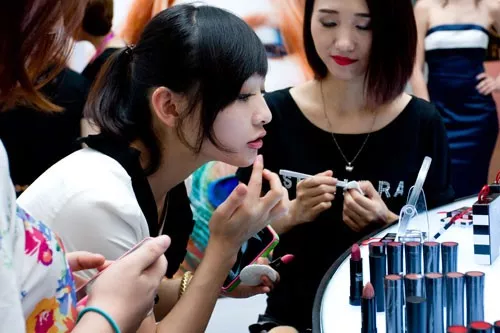
As you enter through the doors of any Chinese shopping mall you are transported into a consumerist’s haven - an abundance of clothing shops for all types of style, electronic goods to fulfil your every need, a variety of eating spots to satisfy anyone’s hunger, and countless beauty stores to help you create the perfect skin. China’s beauty market in 2017 was valued at rmb222.1 billion, and now represents one of the fastest- moving sectors in the consumer goods market. An industry going from strength to strength it presents a huge opportunity for beauty companies looking to expand on a global level.
Beauty is an industry that is important anywhere in the world and, it certainly is no stranger to China. However, as China lives through an age of consumerism, coupled with the growth of an emerging middle-class it has resulted in a new trend for the beauty market. As consumer’s disposable income grows higher, so does their taste. Consumers increasingly desire higher-end products, the market share rising from 27% in 2012 to 31% in 2017. There is a preference for international branded products, their focus changing from being price-sensitive, to quality and brand-driven.
Whilst a strong demand for a cosmetics market in China is comparable to the West, there are still significant differences. Chinese standards of beauty are unlike those of the West. Just from looking at Chinese women, you see porcelain white faces, a touch of light pink blush, and glossy cherry-tinted lip stain. Contrast to the West, where every beauty addict swears by the holy grail of bronzed contouring and bold matte-coloured lipsticks that create perfect voluptuous lips. In China, there is a heavy emphasis placed on skincare, in 2017 the skincare market was worth rmb186.7billion whereas the makeup market was only worth rmb34.4 billion. Different products are demanded in the China market, such as whitening moisturisers, colour correcting creams and blemish balms. Around a quarter of generation Z (born after 1995) from the age of 18 are beginning to use skincare products in their daily beauty routine. Brands that recognise the importance of skincare in the China market, will have a better chance at success when going global.

The beauty market isn’t an easy ride for all though, smaller beauty brands have to grapple with complexities in Chinese law. For the past 30 years, foreign makeup brands have had to comply with compulsory animal-testing regulations to ensure the safety of their products, therefore barring entry to brands such as Lush and Smashbox. NARS beauty brand’s entry into the China market produced a boycott from its overseas customers after it succumbed to Chinese laws for animal- testing. Bold moves similar to NARS, could potentially threaten a company’s reputation, something which many smaller beauty brands can’t afford to sacrifice.
In addition to animal-testing laws deterring away some brands, stricter laws surrounding the daigou market (where a person outside of China purchases goods and then sells them to a customer in China) also block the way for beauty companies and their sales. New e-commerce regulations state that daigou and online platforms need to register with authorities and pay taxes, placing pressure on daigou sales. A time consuming set-up process and high costs makes it difficult for smaller beauty brands to justify entering the China market.
However on the whole, the future looks promising for the beauty market in China. Companies will be best placed in the market with an emphasis on skincare products, as opposed to makeup. Alternatively, looking at another segment could be an option – Chinese men. A new trend set to knockout the beauty market is male cosmetics, the market for male skincare products expanded by 6.9% in 2017. This is due to an increasing number of male consumers who are conscious about their looks and more open to purchasing male cosmetic products. Beauty brands that spend time understanding the beauty market in China and its differences to the West will have the best chance of success.
Please note that this article is from a personal point of view and not based on specific research.